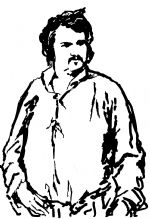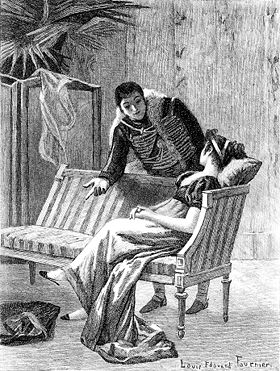La Comédie humaine is an enormous onomastic epic…. In all his work, Balzac presents us with magic names, like that of Fedora or Z. Marcas, prestigious names, like that of Beauséant, comical names, like Beaupertuys, gross names, like Beauvisage, or ignoble, like Crochard or Gaubertin…. Balzac professed, according to his sister, that “invented names don’t give life to imaginary beings, while those that have really been borne give them reality.” It does in fact seem that the further Balzac  advanced into his work, the less he invented or deformed the names he used. Thus the beauty of the Balzacien name comes essentially from the weight it has on human beings, who can never change it, even when they try, like bastards, criminals, or great ladies wishing for a new personality. The bourgeois name is a true tunic of Nessus, which one never manages to completely rip off, especially in the modern French onomastic system, infinitely more binding than the practice of the Ancien Régime, entirely commanded by the father’s name. It is the sign of a civilization of writing. And everyone is obsessed with the desire for an indelible signature, in inscribing his name in the commercial, scientific, historical, or institutional circuit. The bourgeoisie of the 19th century gave itself up to a veritable onomastic debauchery, in “giving” its names to anything and everything, to a product, to streets, to discoveries, mountains, or literary prizes. When Balzac delved with both hands into the names of his neighbors in Tours for his characters’ names, all he did was anticipate this way of behaving. The procedure is the same for places: to take their names is to symbolically appropriate their substance, the best of their being.
advanced into his work, the less he invented or deformed the names he used. Thus the beauty of the Balzacien name comes essentially from the weight it has on human beings, who can never change it, even when they try, like bastards, criminals, or great ladies wishing for a new personality. The bourgeois name is a true tunic of Nessus, which one never manages to completely rip off, especially in the modern French onomastic system, infinitely more binding than the practice of the Ancien Régime, entirely commanded by the father’s name. It is the sign of a civilization of writing. And everyone is obsessed with the desire for an indelible signature, in inscribing his name in the commercial, scientific, historical, or institutional circuit. The bourgeoisie of the 19th century gave itself up to a veritable onomastic debauchery, in “giving” its names to anything and everything, to a product, to streets, to discoveries, mountains, or literary prizes. When Balzac delved with both hands into the names of his neighbors in Tours for his characters’ names, all he did was anticipate this way of behaving. The procedure is the same for places: to take their names is to symbolically appropriate their substance, the best of their being.
 advanced into his work, the less he invented or deformed the names he used. Thus the beauty of the Balzacien name comes essentially from the weight it has on human beings, who can never change it, even when they try, like bastards, criminals, or great ladies wishing for a new personality. The bourgeois name is a true tunic of Nessus, which one never manages to completely rip off, especially in the modern French onomastic system, infinitely more binding than the practice of the Ancien Régime, entirely commanded by the father’s name. It is the sign of a civilization of writing. And everyone is obsessed with the desire for an indelible signature, in inscribing his name in the commercial, scientific, historical, or institutional circuit. The bourgeoisie of the 19th century gave itself up to a veritable onomastic debauchery, in “giving” its names to anything and everything, to a product, to streets, to discoveries, mountains, or literary prizes. When Balzac delved with both hands into the names of his neighbors in Tours for his characters’ names, all he did was anticipate this way of behaving. The procedure is the same for places: to take their names is to symbolically appropriate their substance, the best of their being.
advanced into his work, the less he invented or deformed the names he used. Thus the beauty of the Balzacien name comes essentially from the weight it has on human beings, who can never change it, even when they try, like bastards, criminals, or great ladies wishing for a new personality. The bourgeois name is a true tunic of Nessus, which one never manages to completely rip off, especially in the modern French onomastic system, infinitely more binding than the practice of the Ancien Régime, entirely commanded by the father’s name. It is the sign of a civilization of writing. And everyone is obsessed with the desire for an indelible signature, in inscribing his name in the commercial, scientific, historical, or institutional circuit. The bourgeoisie of the 19th century gave itself up to a veritable onomastic debauchery, in “giving” its names to anything and everything, to a product, to streets, to discoveries, mountains, or literary prizes. When Balzac delved with both hands into the names of his neighbors in Tours for his characters’ names, all he did was anticipate this way of behaving. The procedure is the same for places: to take their names is to symbolically appropriate their substance, the best of their being.—Nicole Mozet, La ville de province dans l’oeuvre de Balzac: l’espace romanesque : fantasme et ideologie (Paris, Societe d’edition d’enseignement superieur, 1982)
La Comédie humaine est une enorme épopée onomastique. Les noms propres sont des morceaux de corps, des morceaux de terre, de purs signifiants. Dans tout son oeuvre, Balzac nous présent des noms magiques, comme celui de Foedora ou de Z. Marcas, des noms prestigieux, comme celui de Beauséant, des noms drolatiques, comme Beaupertuys, des noms grossiers, comme Beauvisage, voire ignobles, comme Crochard ou Gaubertin….
 …cette “singulière theorie sur les noms” que professait Balzac, d’après sa soeur, et qui voulait que “les noms inventés ne donnent pas la vie aux êtres imaginaires, tandis que ceux qui ont réellement été portés les douent de réalité.” Il semble effectivement que Balzac, au fur et à mesure qu’il s’avançait dans son oeuvre, ait de moins en moins inventé et déformé les noms qui’il utilisait. Aussi la beauté du nom Balzacien vient-elle essentiellement du poids que celui-ci fait peser sur les êtres, qui n’en peuvent jamais changer, même quand ils essaient, comme les bâtards, les criminels, ou les grandes dames en mal d’une nouvelle personnalité. Le nom bourgeois est un véritable tunique de Nessus, que l’on ne parvient jamais à arracher complètement, surtout dans le système onomastique français moderne, infiniment plus contraignant que la pratique de l’Ancien Régime, et entièrement commandé par le nom du père. C’est le signe d’une civilisation de l’écrit. Et chacun d’être obsédé par le désir d’une signature indélébile, en inscrivant son nom dans le circuit commercial, scientifique, historique ou institutionnel. La bourgeoisie du XIXeme siècle s’est livrée a une véritable débauche onomastique, en “donnant” ses noms à tous vents, à un produit, à des rues, à des découvertes, à des montagnes ou à des prix littéraires. Balzac n’a fait qu’anticiper sur cette façon d’agir lorsqu’il a puisé à pleines mains dans les noms de ses voisins de Tours pour les faire porter par ses personnages. Le procédé est le même quand il s’agit des lieux: prendre leurs noms, c’est s’approprier symboliquement leur substance, le meilleur de leur être.
…cette “singulière theorie sur les noms” que professait Balzac, d’après sa soeur, et qui voulait que “les noms inventés ne donnent pas la vie aux êtres imaginaires, tandis que ceux qui ont réellement été portés les douent de réalité.” Il semble effectivement que Balzac, au fur et à mesure qu’il s’avançait dans son oeuvre, ait de moins en moins inventé et déformé les noms qui’il utilisait. Aussi la beauté du nom Balzacien vient-elle essentiellement du poids que celui-ci fait peser sur les êtres, qui n’en peuvent jamais changer, même quand ils essaient, comme les bâtards, les criminels, ou les grandes dames en mal d’une nouvelle personnalité. Le nom bourgeois est un véritable tunique de Nessus, que l’on ne parvient jamais à arracher complètement, surtout dans le système onomastique français moderne, infiniment plus contraignant que la pratique de l’Ancien Régime, et entièrement commandé par le nom du père. C’est le signe d’une civilisation de l’écrit. Et chacun d’être obsédé par le désir d’une signature indélébile, en inscrivant son nom dans le circuit commercial, scientifique, historique ou institutionnel. La bourgeoisie du XIXeme siècle s’est livrée a une véritable débauche onomastique, en “donnant” ses noms à tous vents, à un produit, à des rues, à des découvertes, à des montagnes ou à des prix littéraires. Balzac n’a fait qu’anticiper sur cette façon d’agir lorsqu’il a puisé à pleines mains dans les noms de ses voisins de Tours pour les faire porter par ses personnages. Le procédé est le même quand il s’agit des lieux: prendre leurs noms, c’est s’approprier symboliquement leur substance, le meilleur de leur être.

This is an interesting piece, which I enjoyed reading, but I cannot help but mention that Honoré de Balzac’s greatest onomastic creation was … Honoré de Balzac. He had no right to the aristocratic particle nor even the name Balzac. His father was born a peasant and the family were called Balssa until the great novelist exchanged this plebian sounding name for one he thought better suited his genius.